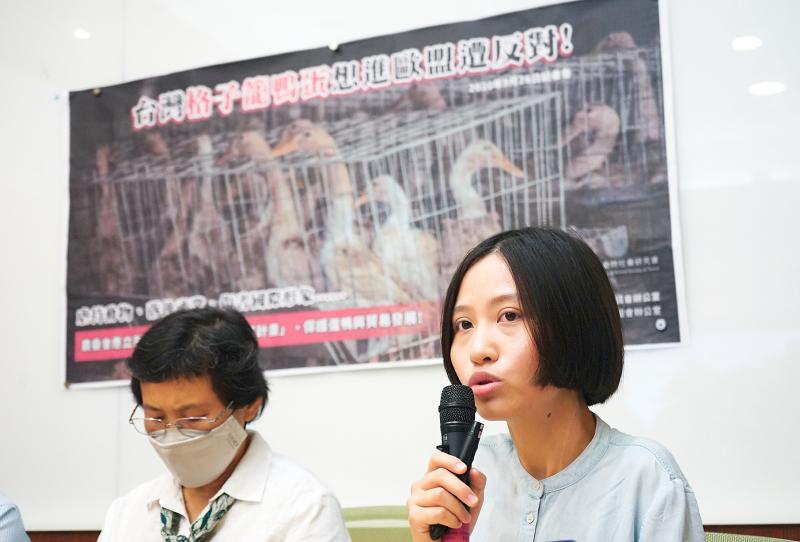The Council of Agriculture should immediately ban the use of battery cages for egg-laying ducks and other animals, the Environment and Animal Society of Taiwan (EAST) said on Monday.
The organization held a news conference in front of the Legislative Yuan in Taipei to call attention to the practice, which many farmers use for its convenience and low cost.
A video played by EAST showed ducks with bloodied feet due to long hours of standing on battery cage wire.

Photo: CNA
The practice has hindered the export of duck eggs to EU countries and, with it, the development of the industry, the organization said.
Most duck farmers in Taiwan have adopted cage-free methods, but some still use battery cages that are only as big as an A4 piece of paper and restrict access to water, EAST researcher Tsun Fang-chu (寸舫筑) said.
The EU in 2012 banned the use of battery cages for egg-laying chickens, while a European Citizens’ Initiative last year to end battery-cage farming garnered a record number of signatories, Tsun said.
More than half of the nation’s exported duck eggs go to the US, although California — the state with the highest ethnic Chinese population — is set to ban the production and sale of eggs produced using battery cage farming from 2022, he said.
This means Taiwan’s duck farmers only have one year to transform the industry, Tsun added.
There are only 20 duck egg farms that still utilize cages, accounting for less than 10 percent of the industry, said Lee Yi-chien (李宜謙), head of the council’s poultry farming section.
The council a few years ago assembled a team of experts to help farms assess and improve their facilities, and in 2018 published a manual to explain best practices and how to establish a cage-free environment, Lee said.
As the farms are the livelihood of many people, the government cannot just order them closed, Lee said, adding that the council is instead providing guidance and low-interest loans to help farmers transition to cage-free facilities.
Each farm is eligible for a subsidy of NT$1 million (US$34,334) and five have already taken advantage of the program, Lee said.
The council plans to phase out cages at the facilities within five years, he added.
New Power Party Legislator Chen Jiau-hua (陳椒華) said that the time frame is too long, adding that the goal could be achieved within a year.
Chen urged the council to raise the subsidy amount.
Cage farming is on its way out, Democratic Progressive Party Legislator Hung Shen-han (洪申翰) said.
The council should discuss the situation at each of the 20 farms with industry actors, then convene a meeting to decide how to conform to international market trends to resolve the matter as quickly as possible, Hung said.
With government assistance and free access to information, battery cage farming can soon be a thing of the past, he added.

A preclearance service to facilitate entry for people traveling to select airports in Japan would be available from Thursday next week to Feb. 25 at Taiwan Taoyuan International Airport, Taoyuan International Airport Corp (TIAC) said on Tuesday. The service was first made available to Taiwanese travelers throughout the winter vacation of 2024 and during the Lunar New Year holiday. In addition to flights to the Japanese cities of Hakodate, Asahikawa, Akita, Sendai, Niigata, Okayama, Takamatsu, Kumamoto and Kagoshima, the service would be available to travelers to Kobe and Oita. The service can be accessed by passengers of 15 flight routes operated by

GIVE AND TAKE: Blood demand continues to rise each year, while fewer young donors are available due to the nation’s falling birthrate, a doctor said Blood donors can redeem points earned from donations to obtain limited edition Formosan black bear travel mugs, the Kaohsiung Blood Center said yesterday, as it announced a goal of stocking 20,000 units of blood prior to the Lunar New Year. The last month of the lunar year is National Blood Donation Month, when local centers seek to stockpile blood for use during the Lunar New Year holiday. The blood demand in southern Taiwan — including Tainan and Kaohsiung, as well as Chiayi, Pingtung, Penghu and Taitung counties — is about 2,000 units per day, the center said. The donation campaign aims to boost

ENHANCING EFFICIENCY: The apron can accommodate 16 airplanes overnight at Taoyuan airport while work on the third runway continues, the transport minister said A new temporary overnight parking apron at Taiwan Taoyuan International Airport is to start operating on Friday next week to boost operational efficiency while the third runway is being constructed, the Ministry of Transportation and Communications said yesterday. The apron — one of the crucial projects in the construction of the third runway — can accommodate 16 aircraft overnight at the nation’s largest international airport, Minister of Transportation and Communications Chen Shih-kai (陳世凱) told reporters while inspecting the new facility yesterday morning. Aside from providing the airport operator with greater flexibility in aircraft parking during the third runway construction,

American climber Alex Honnold is to attempt a free climb of Taipei 101 today at 9am, with traffic closures around the skyscraper. To accommodate the climb attempt and filming, the Taipei Department of Transportation said traffic controls would be enforced around the Taipei 101 area. If weather conditions delay the climb, the restrictions would be pushed back to tomorrow. Traffic controls would be in place today from 7am to 11am around the Taipei 101 area, the department said. Songzhi Road would be fully closed in both directions between Songlian Road and Xinyi Road Sec 5, it said, adding that bidirectional traffic controls would